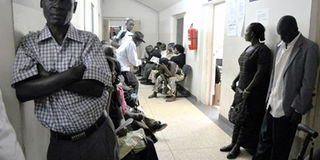Majority Ugandans not happy with services in govt health units - study

Patients wait to be attended to at the cancer ward in Mulago Hospital recently. A study has shown that long waiting hours are the common cause of dissatisfaction in government health centres.PHOTO BY RACHEL MABALA
What you need to know:
Findings. The poor state of the health sector further brought into perspective, with the attitude of the nurses ranked lowest.
Kampala.
Majority of Ugandans are dissatisfied with the health services given at public health facilities, a new survey shows.
A 2013 study conducted by Medicines Transparency Alliance (MeTA) Uganda has shown that 53 per cent of Ugandans are unhappy with services in public health facilities despite reported increase in medicine availability.
The survey based its findings on the time taken for patients to be attended to, time taken to get medicine, attitudes of the prescriber, the dispenser, nurses and complaint handling and laboratory services.
According to the findings, the attitude of the nurses ranked lowest at 28 per cent while complaint handling and laboratory services were found to be at 30 and 35 per cent respectively.
The study results also show that availability of medicines was high at 80 per cent. Accordingly, 58 per cent of the respondents said long waiting hours are the common cause of dissatisfaction, while inadequate medicines were cited by 42 per cent.
Other challenges cited include rude staff, poor sanitation, staff absence on weekend and night shifts, and some staff demanding money for treatment and, in fewer cases, facilities closing for a whole week or opening on selected days.
But the assistant commissioner for Quality Assurance in the Ministry of Health, Dr Sarah Byakika, said some of the issues such as bad attitude are a direct result of big workload, low staffing levels as well as poor pay.
“At the national level, staffing has remained low at 65 per cent. This increases workload for the few health workers, and increases the waiting hours,” said Dr Byakika.
Using the essential medicines list, the MeTA group also found availability of medicines at 63 per cent, indicating a slight improvement from 57 per cent in 2012.
The surveyors also reported a mismatch between the quantities of medicines supplied and the disease burden, indicating a planning gap.
The Permanent Secretary at the Ministry of Health, Dr Asuman Lukwago, attributed this to low morale among health workers due to poor pay, irregular pay and exhaustion.
The chairperson Uganda Nurses and Midwives Union, Ms Janet Obuni, however, said low client satisfaction should not be blamed on the nurses but rather a combination of factors including the conditions under which they work.




